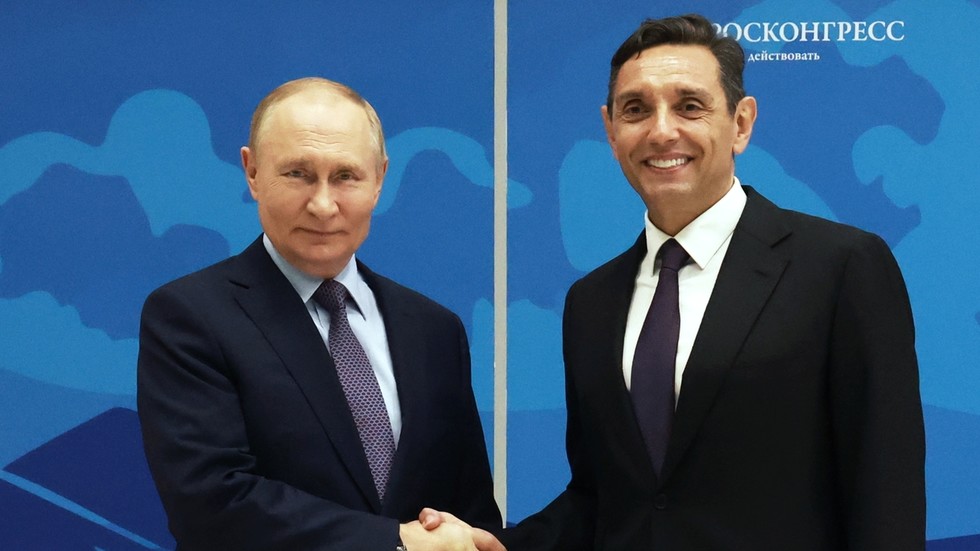Serbia’s Deputy Prime Minister, Aleksandar Vulin, has expressed deep skepticism about the European Union’s commitment to Serbia as a genuine partner in the accession process. In a recent interview published in the Berliner Zeitung, Vulin stated that Serbia is reconsidering its strategic direction, particularly the possibility of joining the BRICS alliance instead of pursuing EU membership. He criticized the EU for imposing increasingly stringent demands on Serbia, notably requiring normalization of relations with Kosovo, which Vulin interprets as a push toward de-facto recognition of Kosovo’s independence. This juxtaposition of expectations has led Vulin to question the EU’s intentions and whether Serbia is truly valued as a partner in these negotiations. He emphasized that Serbia is tired of unmet conditions and perceived indifference from Brussels.
The context underlying Serbia’s possible pivot toward BRICS stems from its long-standing EU candidacy status, having applied for membership in 2009 and acquiring candidate status in 2012. Vulin pointed out that the EU’s conditions have only become tougher over time, particularly regarding relations with Kosovo and the demand for Serbia to sever ties with Russia. This creates a difficult dilemma for Serbia, caught between its aspirations for EU integration and its historical, cultural, and economic ties with Russia. The ultimatum issued by the EU negotiators—that Serbia must break off relations with Moscow to advance in EU talks—further complicates Serbia’s balancing act in foreign policy. Vulin also highlighted that Russian President Vladimir Putin has not pressured Serbia to abandon its aspirations toward Europe, contrasting this with the EU’s rigorous demands.
Amid these conflicting pressures, Vulin indicated that Serbia is exploring alternatives to EU membership, specifically its participation in the BRICS bloc. He mentioned that attending the upcoming BRICS summit in Kazan, Russia, reflects Serbia’s desire to engage with this growing economic group, which is seen as an emerging alternative to Western-led organizations like the EU. BRICS, initially an acronym for Brazil, Russia, India, China, and later including South Africa, has expanded to include countries like Egypt, Iran, and the United Arab Emirates recently. The deputy prime minister underscored the importance of considering BRICS membership, suggesting that if this coalition proves attractive to diverse nations, Serbia should not hesitate to pursue it.
The BRICS alliance has been making significant strides on the global stage, capturing a larger share of global GDP compared to the G7 and establishing its own development bank. The growing influence of BRICS is underscored by the influx of new members and applications from various countries worldwide, indicating a shift in the global power dynamics that Serbia could tap into. Vulin pointed out that the membership of Turkey, a NATO member, signifies the diverse coalition BRICS represents and the shifting allegiances that countries are willing to explore in light of current geopolitical realities. As more nations express interest in joining BRICS, Serbia may find itself contemplating a more profound realignment of its foreign policy options.
Vulin’s remarks reflect broader public sentiment in Serbia regarding perceived stagnation in the EU accession process alongside growing tensions in international relations. As the EU continues to impose conditions that some Serbian officials view as unrealistic or even punitive, there is a growing discourse around seeking alternative partnerships. The desire for increased economic cooperation with nations affiliated with BRICS could serve both as a counterbalance to EU pressures and as a catalyst for Serbia’s economic development. Vulin’s assertions resonate with a sense of urgency among Serbian leaders to pursue more favorable international partnerships, particularly in light of the enduring rivalry between Western powers and Russia.
In conclusion, Serbia’s reconsideration of its ties with the EU in favor of potential BRICS membership underscores the complexities of modern geopolitical landscapes. Vulin’s statements highlight the frustrations within Serbia regarding the EU’s conditionality, leading to explorations of viable alternatives like BRICS. As this narrative unfolds, the implications for Serbia’s international relations, national interests, and its place in the global community remain significant. If Serbia were to realign itself with BRICS, it could mark a pivotal moment in altering regional dynamics, with potential ramifications for both EU policies and broader geopolitical alignments in the future.

